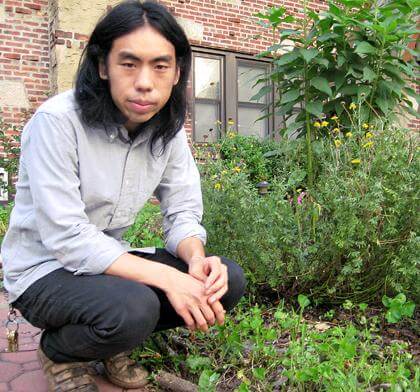By Anna Gustafson
Hearing Casey Tang list the more than 30 species in his garden, it is hard to believe he is only working with an approximate 20-by30 foot area in the front yard of a Rego Park home.
But he is, and Tang, 24, has planted a variety of plants, from Anise Hyssop, a lavender flowering plant that tastes like licorice, to yarrow, a plant often used to ward off soil erosion and to season soups, in the front of his childhood home on 62nd Drive. For the past two years, Tang, who recently moved from Rego Park to Brooklyn, has carefully cultivated an urban forest garden.
“If you can grow your own food, that leads to a lot of freedom,” Tang said.
To create a forest garden, individuals plant foods that replicate a woodland ecosystem. Tang, for example, has planted 33 different species, including sunchokes, chives, chamomile, French sorrel, strawberries, gooseberries and persimmons. Most of Tang’s plants came from places like the Union Square farmer’s market in Manhattan and area nurseries.
A forest garden takes little effort and, because it consists of perennials, could even grow independently within about a decade of first planting it.
“Forest gardening is very low-maintenance,” Tang said. “There’s no tilling. It’s a very interesting way of growing food.”
Tang, who works as an assistant to Xu Bing, a famous Chinese artist living in Brooklyn, said he was first inspired to grow his garden after he graduated from SUNY Purchase and began to read about food cultivation. His readings eventually led him to Dave Jacke, a teacher who wrote “Edible Forest Gardens” and with whom Tang spent time living in an eco-village in Massachusetts several years ago.
“Self-sufficiency for me is really important,” Tang said. “You don’t have to rely on governments or corporations if you’re self-sufficient. Most of the food we eat and buy, it’s really sad.”
Tang said he has found the public’s recent interest in the importance of food, including where it comes from and how it is grown, inspiring. Authors like Michael Pollan, a journalist who wrote the best-selling “In Defense of Food” and “The Omnivore’s Dilemma,” and Eric Schlosser, who wrote “Fast Food Nation,” have brought the issue of food production into a mainstream dialogue on nutrition.
“If everybody grew a garden, it would be great,” Tang said. “People would start sharing food. You’d get to know your neighbors.”
Forest gardens could play a significant role in weaning people off dependency on mass-produced food, Tang added.
“A lot of people think farming is great, and it is, but it’s a lot of hard work and a lot of people don’t realize that,” Tang said. “So you have a lot of people who have never farmed who might give up when they realize how much work it is. That’s why people should do forest gardening.”
Tang said he hopes to give away his plants to individuals who want to start their own forest gardens.
To contact Tang, e-mail him at ctanguno@gmail.com.
Reach reporter Anna Gustafson by e-mail at agustafson@cnglocal.com or by phone at 718-229-0300, Ext. 174.































